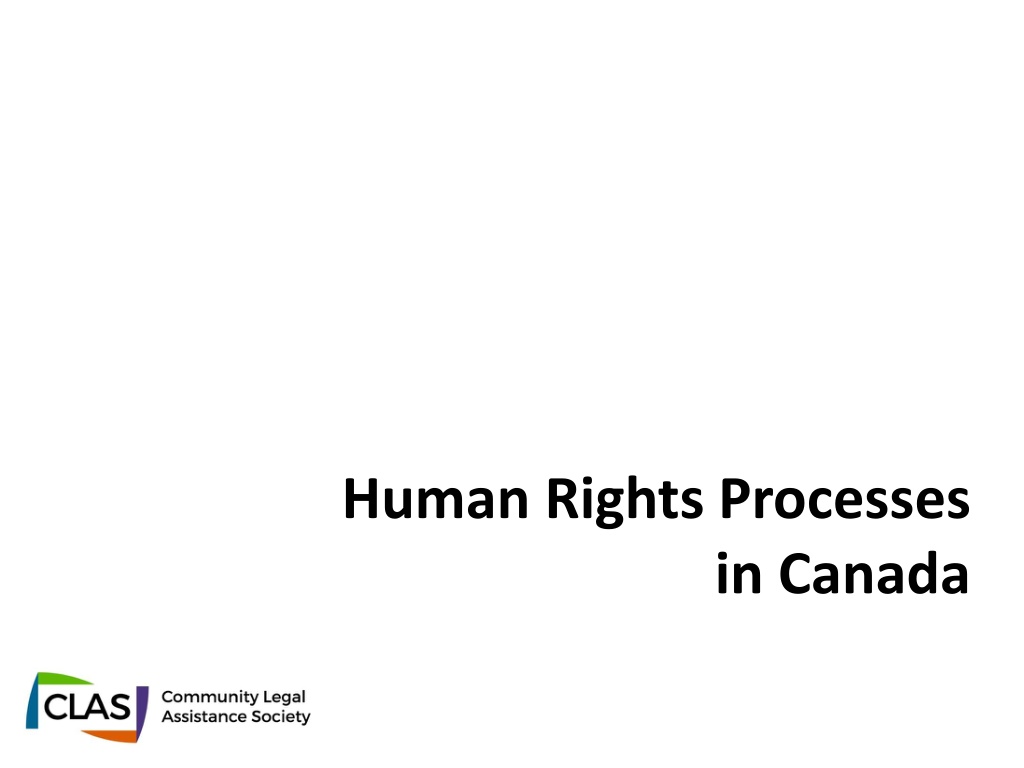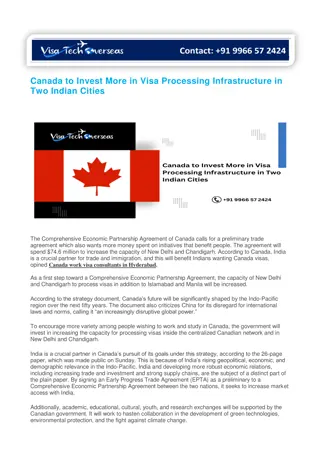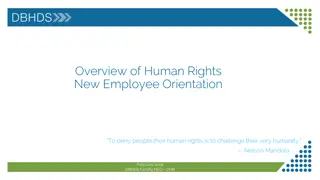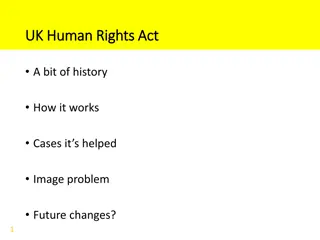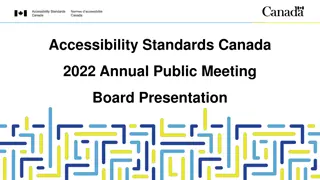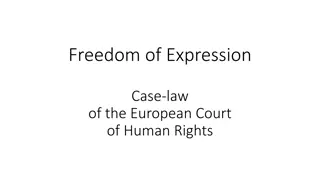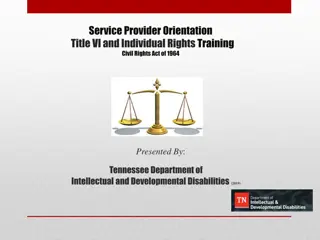Human Rights Processes in Canada: Legislation and Protections Explained
Understand the human rights processes in Canada, including the two general sources of human rights, human rights legislation, federal vs. provincial/territorial laws, and the specifics of the BC Human Rights Code. Learn about direct and indirect discrimination, duty to accommodate, and the areas protected under the BC Human Rights Code.
Uploaded on Dec 08, 2024 | 0 Views
Download Presentation

Please find below an Image/Link to download the presentation.
The content on the website is provided AS IS for your information and personal use only. It may not be sold, licensed, or shared on other websites without obtaining consent from the author. Download presentation by click this link. If you encounter any issues during the download, it is possible that the publisher has removed the file from their server.
E N D
Presentation Transcript
Human Rights Processes in Canada
Two General Sources of Human Rights 1. Human rights legislation 2. Constitution and the Canadian Charter of Rights and Freedoms
Human Rights Legislation - Legislation passed by the legislative assemblies of the federal, provincial, and territorial governments - Must not discriminate because of the race, colour, ancestry, place of origin, religion, marital status, family status, physical or mental disability, sex, sexual orientation, gender identity or expression, or age of that person or class of persons.
Federal vs Provincial/Territorial Canadian Human Rights Act Covers federally regulated employment and services: First Nations governments Banks Trucking companies Broadcasters Canadian Human Rights Commission Canadian Human Rights Tribunal * Canadian Transportation Agency BC Human Rights Code Covers employment, tenancy and services within the province Some variation across provinces and territories, but lots of similarities across the country Direct access to the BC Human Rights Tribunal NEW BC Human Rights Commission
BC Human Rights Code - Areas protected: In our jobs Wages, hiring decisions, promotions, termination, terms and conditions of employment, harassment In our homes Renting or buying property In our access to services and facilities that are open to the public Businesses, hotels, stores Community centres, government services, schools Unions and professional associations Publications
BC Human Rights Code - Direct discrimination: treating someone differently in a way that causes disadvantage - Indirect / adverse effect discrimination: where a requirement, qualification or factor which is not discriminatory on its face results in exclusion or disadvantage - Intention: not necessary to discriminate - Duty to accommodate: must provide reasonable accommodation up to the point of undue hardship
BC Human Rights Tribunal - Independent tribunal acts as decision-maker - Hears and decides human rights complaints - No filing fees free to access - Offers free mediation services - Can order compensation and other remedies for discrimination - One year deadline to file a complaint
Exhausting Options - Enforcement Human rights complaint filed with BC Human Rights Tribunal BC Human Rights Tribunal decisions can be judicially reviewed by BC Supreme Court BC Supreme Court decisions can be appealed to the BC Court of Appeal BC Court of Appeal decisions can be appealed to the Supreme Court of Canada with leave
Charter of Rights and Freedoms - Supreme law of Canada all law and state action must comply with the Charter 15. (1) Every individual is equal before and under the law and has the right to the equal protection and equal benefit of the law without discrimination and, in particular, without discrimination based on race, national or ethnic origin, colour, religion, sex, age or mental or physical disability.
Charter of Rights and Freedoms - Can challenge legislation as a violation of the Charter if the court agrees it can strike down the law or make other orders to correct the constitutional violation Fleming Ontario mental health legislation that permitted non-consensual psychiatric treatment contrary to the wishes of patients violated the Charter right to security of the person and was struck down
Charter of Rights and Freedoms - If it s government action can apply for Charter remedies: Anyone whose rights or freedoms, as guaranteed by the Charter, have been infringed or denied may apply to a court for appropriate and just remedies E.g. a declaration of rights violations or damages Eldridge failure to provide sign language interpreters in delivering medical services was not a flaw in the legislation, but in the way the service was delivered. Court declared that the failure violated s. 15 and directed the BC government to administer law in a manner consistent with the requirements of s. 15
Exhausting Options - Enforcement Cases challenging legislation or seeking Charter remedies can be filed in superior courts e.g. the BC Supreme Court BC Supreme Court decisions can be appealed to the BC Court of Appeal BC Court of Appeal decisions can be appealed to the Supreme Court of Canada with leave These slides are for information and education purposes and should not be relied on as legal advice.
